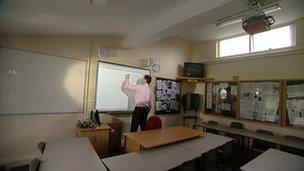University-led secondary PGCEs face uncertain future
- Published

There are more than 34,000 PGCE and under graduate teacher training places for 2012-13
More than 300 university-based teacher training courses in England could face closure or merger, as funds are switched towards school-based training.
The body which funds teacher training says secondary school courses with 10 students or fewer are "potentially unviable" and there are no guarantees of funding for them from 2013.
The government says fewer secondary teachers are needed, but universities will continue to play a "vital role".
Academics warn expertise will be lost.
They say student teachers on university-based courses typically spend two-thirds of their time in schools and argue that the distinction being made between the two routes into teaching is false.
Universities which run teacher training courses have received a letter from the Training Development Agency (TDA), which says secondary courses with small numbers of students will only be funded if they are delivered through "school-led programmes".
'No guarantee'
The number of places universities can have for teacher training is set by the TDA.
There are now about 330 secondary school courses which have been allocated 10 places or fewer.
The letter from the TDA says: "The reduction in secondary school places and the Department for Education's strategy to increase school-led provision may result in some providers having to consider their involvement in initial teacher training.
"There are a number of cohorts that have been identified as potentially unviable due to their small size."
It goes on: "We are informing providers now that there is no guarantee that they will be allocated any places in the identified small cohorts for 2013-14 onwards".
The TDA expects universities to merge courses either within or between institutions, so, for example, one university in a region might agree to train geography teachers and another history teachers.
The Universities Council for the Education of Teachers (Ucet) has written to the Education Secretary Michael Gove to "express concern".
The group's executive director, James Noble Rogers, said universities and their partner schools were best-placed to say whether or not courses were viable.
He said it was essential that in allocating places, the Department for Education and the TDA did not "inadvertently jeopardise the high quality infrastructure that currently exists".
"The loss of that infrastructure would do considerable damage to the education that our children receive and would inevitably lead to teacher supply problems in the future," he said.
Falling pupil numbers
Mr Gove believes more teacher training should be school-based and says schools should be more involved with what is taught on university-based courses.
Under the Graduate Teaching Programme, graduates can opt to train "on the job" in schools, usually on a one-year programme.
Around 100 outstanding schools have already been selected to be "teaching schools".
A spokesman for the Department for Education said: "Funding is provided to train up the required number of new teachers.
"The fact is that pupil numbers are falling sharply in secondary schools so it's common sense that the number of new teachers required also declines - the taxpayer would rightly ask questions if we continued to train people who had no jobs to go to.
"Universities play a vital role in much of the best teacher training and will continue to do so."
Simon Gibbons, from the National Association for the Teaching of English (Nate), said: "The worry is that moving teacher training from universities to schools is going at such a pace, university departments will be under threat and in a position where they can't sustain their courses and will have to close.
"Ofsted says university-led courses are good and I fear the loss of expertise these changes will bring. The shift has the potential to take away outstanding provision and there is also a wider threat to research and on-going training for teachers."
The TDA said it was giving universities notice of the changing funding arrangements so that they could plan future courses.
A spokesman said: "The identification of smaller cohorts is not an automatic signal that these places will necessarily disappear next year; rather that these are the obvious cohorts to be reviewed.
"It is possible that some larger cohorts will also feature in this process".
- Published24 November 2010
- Published20 September 2011
- Published11 August 2011
- Published27 June 2011